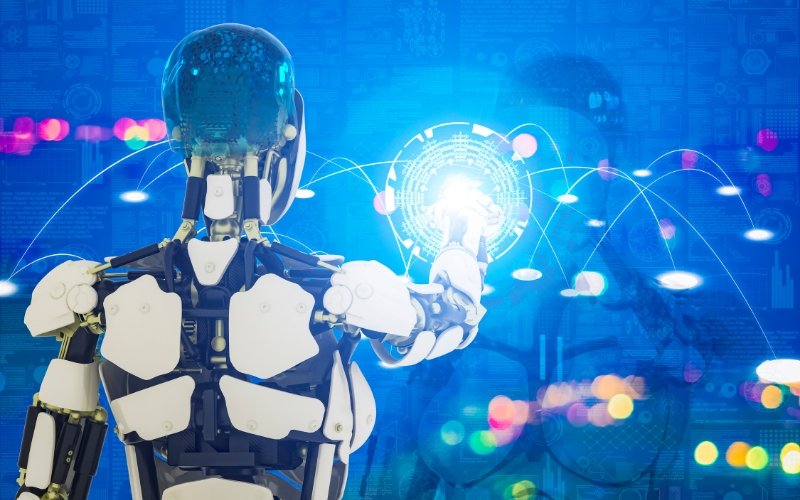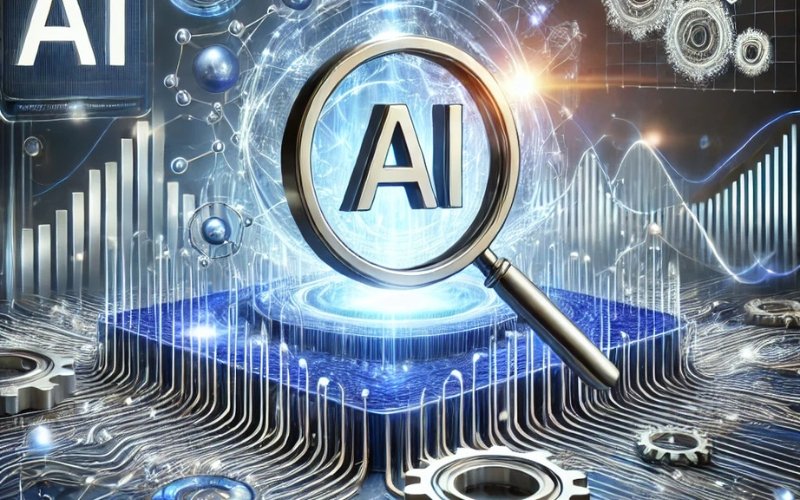Search Engine Optimization (SEO) has always been an evolving field. As algorithms change and user behaviors shift, SEO strategies need constant adaptation. In 2024, one of the most significant influences on SEO is Artificial Intelligence (AI) and Machine Learning (ML). These technologies are fundamentally altering how websites are optimized, how search engines rank content, and how users interact with digital platforms.
Here’s a deep dive into how AI and machine learning are transforming SEO in 2024 across several key areas.
1. AI-Powered Keyword Research: Revolutionizing How We Find Search Terms

Traditional keyword research has often been a manual, data-driven process. SEO experts would look at search volumes, competition, and trends to target relevant keywords. But AI has completely transformed SEO by revolutionizing this process. Tools powered by AI not only analyze search volumes but can predict future keyword trends by understanding semantic relationships between words and assessing user behavior.
AI-driven keyword research tools analyze billions of data points, including search behavior, local preferences, and conversational queries, providing SEO professionals with a more holistic view. These tools are pivotal in transforming SEO, enabling marketers to focus on long-tail keywords, search intent, and user needs that are just starting to emerge. Instead of reacting to trends, AI allows SEO professionals to stay ahead of them by predicting what users will be searching for in the near future.
For example, AI can automatically generate keyword clusters based on user search patterns, further transforming SEO strategies by making it easier to create content that ranks for a variety of related terms. This predictive analysis is key to smarter content strategies, targeting keywords that are not only relevant today but will continue to be valuable in the long run. With these advancements, AI has become an essential part of transforming SEO, ensuring marketers stay ahead of the competition.
2. Content Creation and Optimization with AI: Enhancing User Experience
AI’s impact on content creation is undeniable, fundamentally transforming SEO strategies. Natural Language Processing (NLP), a branch of AI, allows machines to understand the context and semantics of human language better than ever before. This advancement enables AI-powered content tools to generate high-quality articles, blog posts, and even product descriptions that are optimized for SEO, playing a pivotal role in transforming SEO practices.
Content optimization has also been transforming SEO with AI-driven tools like Grammarly and Clearscope. These tools analyze content structure, readability, and keyword density, providing SEO recommendations based on real-time data. By ensuring that content aligns with user search intent and meets the latest SEO best practices, AI continues transforming SEO into a more data-driven and efficient process.
Additionally, AI identifies gaps in content, suggesting areas where additional information could enhance relevance and boost rankings. This proactive approach is instrumental in transforming SEO by ensuring that content not only meets but exceeds user expectations.
Moreover, AI helps create personalized content experiences. By analyzing user data, machine learning algorithms can tailor content to match user preferences, making the experience more engaging and increasing the likelihood of repeat visits. This level of customization further emphasizes how AI is transforming SEO into a user-centric discipline.
3. Personalized Search: How Machine Learning is Shaping SERPs

One of the biggest changes AI and machine learning have brought to SEO is the shift towards personalized search results. Search engines, led by Google, now use machine learning algorithms to deliver more customized search results based on a user’s behavior, search history, location, and even preferences. This evolution highlights how Transforming SEO is central to adapting to these changes.
In 2024, SEO professionals need to be mindful of this personalization when crafting strategies. No longer can a one-size-fits-all approach to SEO work. Instead, businesses need to focus on Transforming SEO practices to optimize content for different audience segments, taking into account location-specific queries, device preferences, and even previous user interactions with the brand.
For example, someone searching for “best restaurants” in New York will see different results compared to someone searching for the same in Los Angeles, even if they both use the exact same keyword phrase. These personalized aspects of search reinforce the importance of Transforming SEO to cater to unique user needs.
SEO strategies must now consider localized and personalized aspects of search to rank higher. By doing so, businesses stay ahead of the curve in Transforming SEO to meet the demands of a constantly evolving search landscape.
4. AI and Voice Search: Optimizing for Conversational Queries
With the rise of virtual assistants like Siri, Alexa, and Google Assistant, voice search has become a significant part of SEO strategies. AI and machine learning are at the heart of these voice search technologies, and they have brought about changes in how users search online. Unlike traditional text-based searches, voice queries are conversational, longer, and often posed as questions.
This shift means that SEO strategies in 2024 must prioritize optimizing for conversational keywords. AI-driven tools can help identify these long-tail, natural-sounding keywords, and guide content creation to reflect the way users speak. Phrases like “what’s the best pizza place near me?” are far more common than a simple “best pizza NYC,” and content needs to accommodate this shift in user behavior.
Additionally, AI tools help analyze voice search trends, identifying which types of questions are gaining popularity and helping marketers tailor their content accordingly.
5. Predictive Analytics in SEO: Anticipating Trends and Changes
One of the most exciting applications of AI and machine learning in SEO is predictive analytics. Predictive analytics allows SEO professionals to anticipate future trends by analyzing historical data, search patterns, and emerging technologies. Instead of reacting to changes in user behavior, SEO experts can proactively adjust their strategies to stay ahead of the competition.
For example, predictive analytics can forecast seasonal trends, helping businesses prepare for spikes in search traffic around specific times of the year. It can also identify emerging search behaviors or shifts in popular keywords, giving marketers the opportunity to create content around these trends before they become saturated.
Predictive tools also provide recommendations on the best times to publish content, based on historical engagement rates, and can even suggest which topics will likely gain traction in the future.
6. AI for Technical SEO: Streamlining Audits and Fixes
Technical SEO is critical for ensuring that websites are optimized for search engine crawlers, speed, and user experience. However, the process of performing SEO audits can be time-consuming and complex. AI tools have made it easier to identify technical issues on websites, such as broken links, crawl errors, duplicate content, and slow page loading times.
AI-powered tools like Screaming Frog and SEMrush can scan entire websites in minutes, providing detailed reports on areas that need improvement. They don’t just identify problems, but also suggest potential fixes, saving SEO professionals hours of manual work.
Moreover, AI can now help automate certain technical fixes, such as optimizing images, compressing files, or improving mobile responsiveness, streamlining the optimization process and improving overall site performance.
7. AI and Link Building: Smarter Strategies for Authority and Ranking

Link building remains a crucial factor in SEO rankings, and AI is making this process more intelligent. AI can analyze backlink profiles and assess the quality and relevance of the links pointing to a website. It can also help identify the best sites to target for outreach based on authority, relevance, and the likelihood of securing a link.
Machine learning algorithms analyze patterns in successful link-building campaigns, allowing SEO professionals to replicate strategies that work. AI can even predict which types of content are more likely to attract links, enabling more effective content marketing and outreach strategies.
For instance, AI tools can analyze competitor backlinks to find opportunities that your site may have missed. This data-driven approach to link building not only improves SEO performance but also helps businesses build more authoritative and trustworthy websites.
Conclusion
AI and machine learning are fundamentally changing the way SEO is approached in 2024. From smarter keyword research and content creation to personalized search results and voice optimization, these technologies offer opportunities to stay ahead of the curve. By integrating AI and machine learning into your SEO strategy, you can ensure better search rankings, more targeted traffic, and a more engaging user experience.
The future of SEO lies in the hands of these technologies, and businesses that embrace them will be the ones to thrive in the ever-evolving digital landscape.

